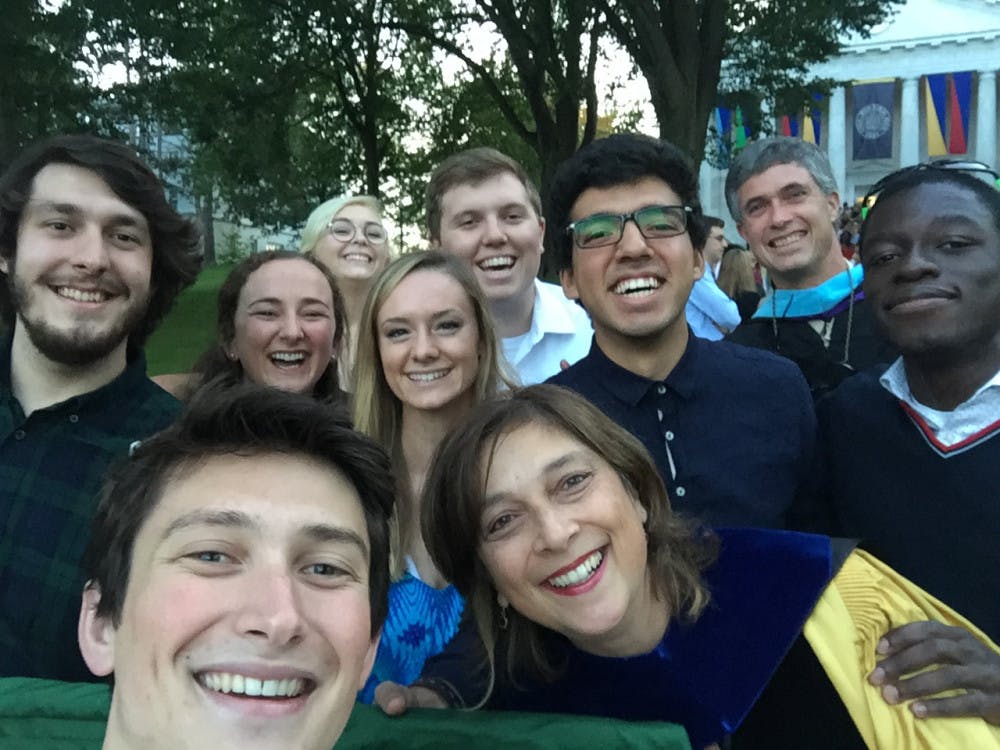Members of the Class of 2021 were officially welcomed to Middlebury on Sep. 10 at the college’s annual Convocation.
The 638 first year students that filled Mead Chapel for the event were admitted from a field of 8,910 applicants, and comprise one of the largest classes in the college’s 217-year history. The Class of 2021 brings the total number of enrolled undergraduate students to 2,753.
At last Sunday’s ceremony Dean of Admissions Greg Buckles noted 13 percent of this year’s class are first-generation college students and 27 percent are people of color, the highest percentage in the college’s history.
Though he cited the achievements of many incoming students, Buckles reminded those in attendance that the admissions process is not a treasure hunt.
“We’re not looking for fully formed 18 year-olds. We’re not looking for perfection, nor should you get wrapped up in finding perfection here at Middlebury,” he said. “The truth is you’re not going to find it.”
Buckles advised the Class of 2021 to work hard, be resilient, take risks, and not be afraid of failure. In doing so, he said, students can and will find the best versions of themselves.
“Remember what it was about Middlebury that made you want to apply and come here,” he said. “Relish that as you set about your path and find your way.”
Student Government Association President Jin Sohn ’18 echoed Buckles’s advice, and told students to make the most of their time at Middlebury, and to think of ways they can improve the college for subsequent generations of students.
“Think about those who will come after you,” she said. “Do things that will leave Middlebury a better place than you found it.”
The event ended with a speech from College President Laurie Patton, who began her remarks by acknowledging that adjusting to life at Middlebury can be both exhilarating and disorienting, especially when everyone is “as talented as you are.”
“Maybe you’ve already met one of your new classmates who’s a published novelist and three-season varsity athlete, who started her own NGO and hike d the Appalachian trail solo. And the most annoying thing was, as you’ve probably already discovered, she was really nice, too,” Patton said. “That’s the Middlebury way.”
Patton advised students not to compare themselves to one another, and said the best way for one to leave their mark on Middlebury is to, simply, be oneself.
“We chose you because we sensed, and you did too, that there was something about you and this place that made a really wonderful match,” she said.
Patton told the incoming class that, at Middlebury, students are expected to be citizens of a “robust and inclusive public sphere, where you will likely be uncomfortable.”
Though she did not mention the Charles Murray protest by name, she emphasized the college’s commitment to freedom of expression and inclusivity, two issues that have been, and still are, at the forefront of campus-wide conversations in the aftermath of the protest.
“As members of [our] community, you have a particular obligation to that public space: make it more robust, and make it more inclusive. Don’t let others be silenced, and don’t let yourself be silenced, even if you are offended,” Patton said. “Always look around to see who is included, and how you could use your talent and wisdom to include others’ voices in the debate. And respect others’ wishes to learn and grow, even if you dislike their opinions. That is true wisdom.”
Patton ended her remarks by reiterating the need for students to be their best selves, and by reminding them that the wider Middlebury community is here to help.
“We will help you grow in your wisdom. We will help you bounce back. We will help you dream the world as it ought to be. And we will be here for you for the rest of your life,” she said. “As one student put it to me, Middlebury is really supportive wilderness training for the mind, heart, body, and soul.”




